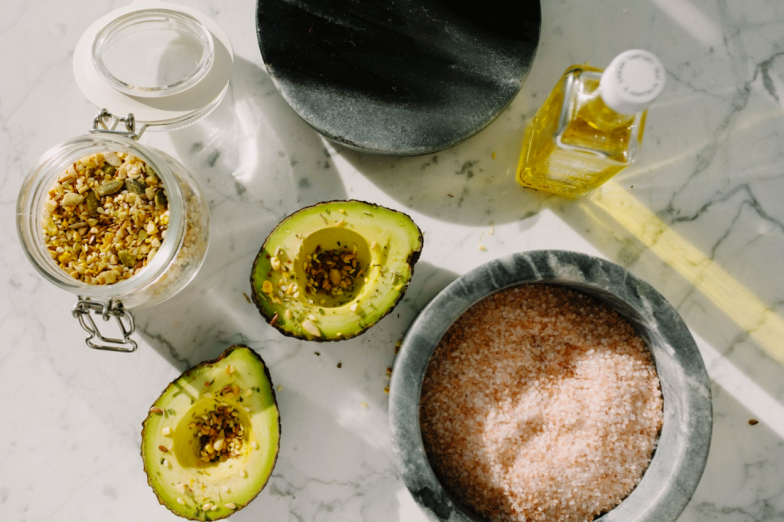
Sea Salt vs. Table Salt: Which Gratifies Your Health Better?
Having already deliberated, the jury is in and we’re poised to open the envelope with their verdict on which is the winner between sea salt vs. table salt!
Sea salt vs. table salt: sea salt packs a flavor punch while table salt is favored by many.
The common availability of sea salt is relatively recent when compared to table salt, and boy, does the marine salt have its fans. Of different colors, shine, flavors, and sizes of granule, this salt is making the rounds as the choice salt for your health. Well, we couldn’t agree more! Regarding the sea salt vs. table salt debate tussle, sea salt delivers a knockout of benefits that has table salt bouncing out of the boxer’s ring!
Natural salt is a super fascinating substance. Here’s why.

What is natural sea salt?
Natural sea salt is just another name for unrefined salt. Not only does this crystalline mineral contain sodium chloride (NaCl), but also over 80 minerals and trace elements that are needed for you to stay in optimal health, such as iron, sulfur, magnesium, phosphorus, bromine, boron, zinc, and even iodine. All these elements are essential for a healthy life.
We are unable to live without them because they play a critical role in several biological processes, including:
- Carrying nutrients into and out of our body’s cells
- Regulating the amount of water that’s in and around our cells
- Helping all brain functions
- Assisting the electrical impulses of the nerves
- Supporting adrenal function
- Aiding metabolism and digestion
- Maintaining and regulating blood pressure
Most unrefined sea salt typically hails from salt mines, which tap into deep earth areas that used to be former vast expanses of sea beds. Alternatively, sea salt can be produced from seawater through evaporation or can even be found on the surface of the earth, the dried-up product of ancient seas.
Highly healthful, sea salt’s ample source of minerals is especially essential to eat today, as a lot of foods out there are mineral-poor due to modern agriculture methods, as well as intensive food processing and refining, says Dr. Lawrence Wilson, an expert nutritionist on the subject.
Unprocessed sea salt vs. refined table salt
If the minerals and elements that make up salt are so critical for our health, then why does salt have such a bad reputation? The truth is: refined, processed salt tends to be the culprit responsible for all of salt’s bad rep. Genuine sea salt, in turn, is typically a solid deliverer of health so long as it is taken in small-to-moderate amounts.
Processed (or refined), commercial-grade table salt has had all trace elements removed and consists of pure sodium chloride, with an anti-caking agent, and in certain cases, added iodine. Chemically, most table salt has more than 99% sodium chloride in its structure!

According to Dr. Wilson, “[Table salt’s] unbalanced mineral content actually causes more mineral imbalances and high blood pressure. It is too high in sodium and very low in calcium and magnesium, two vital minerals today that can be obtained to a degree from [natural, unrefined] salt.”
In turn, unrefined salts, whether harvested from the sea or mined from land, contain a wide spectrum of trace elements, which are often in the same balance as are available in human blood. These include potassium and magnesium, which assist the body in metabolizing the sodium better.
Because it can hail straight from the waters of the sea through evaporation, toxic metals from the ocean’s water may be found in unrefined sea salt, such as cadmium and lead. Dr. Wilson recommends that people source their sea salt from ancient sea salt mines that are proven to have lower levels of environmental pollutants.
Bottom line: sea salt is the more natural option over common table salt, and has been declared more healthful for your body by far!

Why do we crave salt?
Salt cravings actually are rooted in a real need for a diet which is richer in minerals. In the event of you craving salt, the experts recommend you eat a diet rich in plants and vegetables — the main source of minerals for the body — rather than upping your intake of salt.
The verdict concerning the sea salt vs. table salt debate is out! Sea salt is generally much better for your health than table salt, which some nutritionists consider to be among the worst of “junk foods.”
Start sprinkling some good, ancient sea salt onto your food today! Find more informative blog posts like the one above at: http://www.mobilestyles.com/blog.






